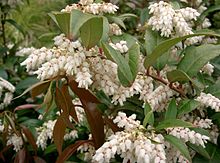Leucothoe is a genus of about 6 species of flowering plants in the family Ericaceae, native to Asia and the Americas.[1] Many species have the common name doghobble. Leucothoe species contain grayanotoxins, a group of closely related neurotoxins named after Leucothoe grayana, native to Japan.[2]
| Leucothoe | |
|---|---|

| |
| Leucothoe axillaris | |
| Scientific classification | |
| Kingdom: | Plantae |
| Clade: | Tracheophytes |
| Clade: | Angiosperms |
| Clade: | Eudicots |
| Clade: | Asterids |
| Order: | Ericales |
| Family: | Ericaceae |
| Subfamily: | Vaccinioideae |
| Tribe: | Gaultherieae |
| Genus: | Leucothoe D.Don |
They are shrubs growing to 1–3 m tall, either deciduous or evergreen depending on species. The leaves are alternate, oblong-lanceolate, 2–15 cm long. The flowers are produced in racemes 3–15 cm long, each flower bell-shaped, 4–20 mm long, white or occasionally pink.
- Selected species
- Leucothoe axillaris (coastal doghobble; southeastern United States)
- Leucothoe davisiae (black laurel; Sierra Nevada, northern California & Oregon)
- Leucothoe fontanesiana (highland doghobble or drooping leucothoe; southeastern United States)
- Leucothoe grayana (Japan)
- Leucothoe griffithiana (eastern Himalaya, southwest China)[1]
- Leucothoe keiskei (Japan)
- Leucothoe populifolia (southeastern United States)
- Leucothoe racemosa (swamp doghobble or sweetbells; eastern United States)
- Leucothoe recurva (redtwig doghobble; southeastern United States)
- Leucothoe tonkinensis (southern China, northern Vietnam)[1]
References
edit- ^ a b c "Leucothoe D. Don". Flora of China.
- ^ Senning A (2007). Elsevier's Dictionary of Chemoetymology. Amsterdam: Elsevier. p. 170. ISBN 978-0-444-52239-9.
External links
edit